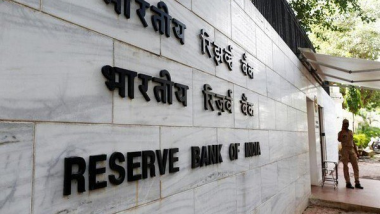New Delhi [India], October 6 (ANI): As expected, the monetary policy committee of the Reserve Bank of India (RBI) in its October review meeting decided to keep the policy repo rate unchanged at 6.5 per cent, maintaining status quo for the fourth straight occasion. The repo rate is the rate of interest at which the RBI lends to other banks.
At the same time, it retained the overall 2023-24 GDP growth and inflation forecast unchanged.
Retail inflation is projected at 5.4 per cent for 2023-24, with Q2 (Jul-Sep) at 6.4 per cent, Q3 (Oct-Dec) at 5.6 per cent and Q4 (Jan-Mar) at 5.2 per cent. For Q1 (2024-25 fiscal), it is projected at 5.2 per cent.
Coming to growth, RBI maintained real GDP growth for 2023-24 at 6.5 per cent with Q2 at 6.5 per cent; Q3 at 6.0 per cent; and Q4 at 5.7 per cent.
That said, the only thing about which the central bank showed utmost concern is the rising inflation and its attached potential risk to growth outlook.
The overall inflation outlook, RBI cautioned, saying it is clouded by uncertainties from the fall in kharif sowing for key crops like pulses and oilseeds, low water at key reservoirs, and volatile global food and energy prices.
RBI Governor Shaktikanta Das said the central bank is concerned and it has identified high inflation as a major risk to macroeconomic stability and sustainable growth. Accordingly, the monetary policy remains resolutely focused on aligning inflation to the 4 per cent target on a durable basis.
Also, the governor noted 5 out of the 6 MPC members are for remaining focused on "withdrawal of accommodation" in monetary policy stance so as to ensure the inflation progressively aligns with the target, while supporting growth.
RBI in its past three meetings - April, June, and August -- held the repo rate unchanged at 6.5 per cent. The repo rate is the rate of interest at which RBI lends to other banks. Barring the latest third straight pause, the RBI raised the repo rate by 250 basis points cumulatively to 6.5 per cent since May 2022 in the fight against inflation. Raising interest rates is a monetary policy instrument that typically helps suppress demand in the economy, thereby helping the inflation rate decline.
Headline inflation in India rose to 7.8 per cent in July due to a surge in prices of food items like wheat, rice and vegetables, including tomatoes, to later fall to 6.8 per cent in August. Inflation data for September is due in next few days.
Following are some of the views of analysts and experts and economists on today's monetary policy outcome:
Dinesh Khara, Chairman, SBI:
The ability of RBI to remain steadfast and focused on pitching key growth deliverables bodes well even as global uncertainties pick pace outside.
Subhrakant Panda, President, FICCI:
RBI has kept the Repo rate and overall stance unchanged as was largely expected, emphasising on withdrawal of accommodation and supporting growth. Inflation needs to be closely monitored, but it seems to have peaked and a correction in prices over the near term looks probable.
In line with the Monetary Policy Committee's observation on recurring food price shocks impacting both the inflation trajectory and its persistence, FICCI reiterates that de-risking food supply chains from weather related disruptions should be a priority. This calls for a comprehensive roadmap and coordinated action at multiple levels.
Ashwini Kumar, Head- Market Data, ICRA Analytics, the wholly-owned subsidiary of ICRA:
The Reserve Bank of India has maintained status quo on policy rates at the just concluded Monetary Policy Committee meeting as inflation persists above the targeted rate, uneven rainfall is likely to affect agri supply ahead of the onset of festive season. Globally, the US Fed persists with its hawkish stance even as oil prices have retreated. The 10-year government bond yield is likely to rise as the central bank has said it will consider Open Market Operations (OMO) sales to manage liquidity in the system. ICRA Analytics foresees the 10Y benchmark yield to trade between 7.25- 7.40 per cent in the near term.
Madhavi Arora, Lead Economist, Emkay Global Financial Services:
The RBI reiterated caution and the current policy narrative is still more hinged to inflation uncertainty and liquidity management than on the fluid and uncertain global narrative as markets reprice 'higher-for-longer'.
As global financial conditions transmit with a lag, there could be further volatility ahead. Even as domestic inflation is likely to meet policy targets by end-FY24, elevated developed market (DM) rates and record-low interest differentials pose a headwind for the RBI.
Shishir Baijal, Chairman and Managing Director, Knight Frank India:
The decision will continue to maintain the existing momentum of residential real estate demand in India. Since the interest rate upcycle, the repo rate has been hiked by 250 bps, resulting in 160 bps rise in home loan rates. Since then, although the overall housing demand has remained upbeat, the lower housing segment or the affordable housing demand has witnessed a deceleration due to a substantial rise in the borrowing costs and other challenges. The stance today should be considered as a big relief for the housing sector of the country which has shown tremendous strength in the face of headwinds over the last year.
Rajani Sinha, Chief Economist, CareEdge:
The Monetary Policy Committee's decision to maintain the current policy rate and stance was on expected lines. Overall, the policy had a hawkish undertone to it. The governor sounded cautious about inflation even though the full-year inflation projection was unchanged.
We expect the RBI to start its rate-cutting journey from the second quarter of next fiscal year as inflation edges closer to 4 per cent target.
Dharmakirti Joshi, Chief Economist, CRISIL:
Steady interest rates with no change in stance was widely expected and par for the course. Despite the second quarter bulge in inflation, the RBI kept its inflation forecast for the current fiscal unchanged at 5.4 per cent.
Further, the incomplete transmission of past 250 basis-points rate hikes to bank lending and deposit rates reinforced MPC's imperative to continue its stance of withdrawal of accommodation.
Food inflation remains a key monitorable not only because it is in double digits, but also because sub-normal monsoon and muted sowing can impact kharif output and prices. Additionally, low reservoir levels do not augur well for the rabi crops.
Anuj Puri, Chairman, ANAROCK Group:
The unchanged repo rate is a festive bonanza for homebuyers and gives them yet another opportunity to make cost-optimized home purchases. If we consider the present trends, the overall consumer market looks bullish across sectors, particularly the automobile and housing markets, which in many ways reflect the health of the economy. We are entering the festive quarter with a very strong momentum in housing sales, and unchanged interest rates will act as a major catalyst for growth in the residential market. (ANI)
(This is an unedited and auto-generated story from Syndicated News feed, LatestLY Staff may not have modified or edited the content body)













 Quickly
Quickly
















